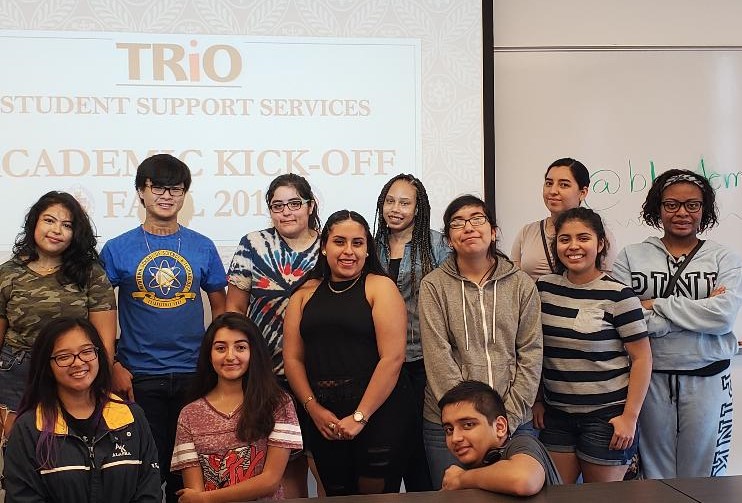 DePaul's SSS program provides advising, academic assistance, mentoring, financial planning, graduate school preparation and career-related services to eligible low-income, first-generation students, as well as students with disabilities. (Image courtesy of Luciano Berardi)
DePaul's SSS program provides advising, academic assistance, mentoring, financial planning, graduate school preparation and career-related services to eligible low-income, first-generation students, as well as students with disabilities. (Image courtesy of Luciano Berardi)
The Department of Education has awarded DePaul's Division of Enrollment Management a $1.6 million grant to provide enhanced academic and mentoring programs through TRIO Student Support Services, known as SSS. DePaul is one of the few universities in the country to have consistently secured the grant since 1997.“DePaul was in the early group to receive and maintain the grant," says Luciano Berardi, director of TRIO programs and access research at DePaul and project director for the grant. “Sustainability of federal support is key."
Housed within the Center for Access and Attainment, the SSS program provides advising, academic assistance, mentoring, financial planning, graduate school preparation and career-related services to eligible low-income, first-generation students, as well as students with disabilities. Led by Christina Tus, DePaul's SSS program serves 200 students per year, drawn primarily from the freshman class. Retention, good academic standing and degree completion are key objectives for the program.
“The student population we serve is at a high risk of dropping out," Berardi says. “The SSS program provides access to services they might not otherwise receive, such as specialized tutoring, assistance with financing their education or to resolve housing and food insecurities. We collaborate with units across the university in order to ensure students receive optimal support that is in alignment with DePaul's mission and values."
Integration across the university makes DePaul's SSS program unique, Berardi explains. Staff from such units as the Center for Access and Attainment, Office of Multicultural Student Success, Career Center and Financial Aid work in partnership with faculty to achieve program objectives.
One area of focus for this new grant cycle includes developing a career pathway strategy. Students will be organized into graduate and professional interest groups, such as education, business and medicine. These learning communities will increase engagement among SSS students who have common interests, enabling them to support one another. A pathway also will be developed between SSS and DePaul's CAA Lab, Mitchem Fellows and McNair Scholars programs. These programs focus on preparing first-generation, low-income or underrepresented students for graduate school and academic careers.
“We help students navigate these pathways and find an area of belonging at DePaul," Berardi says.
Peer and professional mentoring have a large role in the SSS program. Grant funding provides internship opportunities for first-generation and low-income DePaul graduate students who are pursuing careers in education and social services. As graduate advisors, these students gain hands-on experience and practical skills by conducting one-on-one advising sessions with an assigned group of DePaul SSS students each quarter.
Also new to this grant cycle, the Center for Access and Attainment will use a portion of the funding to hire a dedicated retention specialist for the SSS program. Miranda Quinn, current program coordinator in TRIO Student Support Services and DePaul alumna, will serve in this role.
“Whether it's housing insecurity, mental health or childcare needs, we lose roughly 10% of our TRiO population each year," Berardi says. “Having one dedicated retention specialist will allow us to better support these students both academically and personally."
Since the very first grant cycle started in 1997, DePaul's SSS program has always been located within Enrollment Management. Berardi believes this unique organizational structure contributes to the program's success. “Usually SSS programs are part of other student-serving university units," he says. “DePaul's SSS enrollment strategy to recruit students at risk of early academic problems has been successful because we can work with our colleagues from enrollment to identity eligible first-year and transfer students early on," he says. “Not all students need our services for the entire length of their time at DePaul, but integrating educational services for at-risk students as a retention strategy early on, helps to level the playing field."